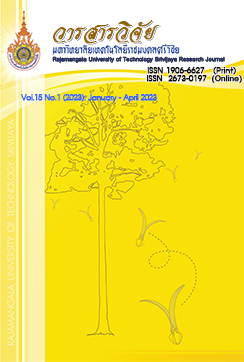Development of Healthy Chili Paste Products from Sacha Inchi (Plukenetia volubills L.)
Keywords:
chili paste, sacha inchi, shelf lifeAbstract
The purpose of the research on the development of healthy burnt water products from Sacha Inchi (Plukenetia volubilis L.) is to develop a healthy chili paste recipe from Sacha Inchi derived from the recipe of chili paste with dried shrimp by using Sacha Inchi to replace the amount of dried shrimp and to study the shelf life of healthy chili pastes from developed Sacha Inchi. In the development of the recipe, the chili paste is made by selecting a recipe for chili paste with dried shrimp as an through 4 recipes and 12 food experts to conduct sensory evaluations. It found that the best chili paste formula to be developed included 12% chili peppers, 12% shallots, 12% garlic, 15% sugar, 10% fish sauce, 8% tamarind juice, 6% water, 15% oil and 10% dried shrimp, with an average overall preference rating of a considerable level (8.70). Dried shrimp was replaced with dehydrated Sacha Inchi with microwave oven with a voltage of 220 volts, 50 hz for 5 minutes in volume 10, 20, 30, and 40% of the amount of dried shrimp in the mixture and evaluated by sensory tests, and quality of chili paste was measured by color, free water content, peroxide and nutritional value. The results found that the chili paste formula, which uses 10 % of Sacha Inchi to replace dried shrimp, scored a large average overall preference rating (8.65), brightness (L*), red (a*), yellow value (b*) and free water content (aw) of 26.42, 2.98, 1.46 and 0.80, respectively. Peroxide content of 8.23 mg of oxygen peroxide was equipped with 1 kg of oil and aflatoxin was not found. The total amount of microorganisms, yeast and fungus content was less than 10 colonies per gram. It contains moisture content, protein, fat, carbohydrates, ash, fiber, and energy equal to 25.12 %, 22.04%, 20.70%, 37.60%, 1.38%, 5.11%, and 398 kcal, respectively. Regarding the shelf life accelerated with temperatures (Q10) at 25 and 35 °C, the storage time is 63 and 28 days, respectively. The Q10 value is 2.25, which makes it possible to predict the shelf life of products at 5 oC and 10 oC for 318 days and 212 days.
References
AOAC. 2012. Official Method of Analysis. 17th ed. Association of Official Analytical Chemist, Washington DC, USA.
Chaipan, P. 2018. Reduction of Beany Flavor for Sacha Inchi flour Quality Improvement and Utilization as Ingredient in Functional Food Product. Master Thesis of Science, Faculty of Science, Burapha University. (in Thai)
Chirinos, R., Zuloeta, G., Pedreschi, R., Mignolet, E., Larondelle, Y. and Campos, D. 2013. Sacha inchi (Plukenetia volubilis): a seed source of polyunsaturated fatty acid, tocopherols, phenolic compounds, phytosterols and antioxidant capacity. Journal of Food Chemistry 141: 1732-1739.
Fermendez, Y., Obregon, A., Medina, M., Martinez, E. and Navarro, E. 2015. Obtaining Cheese with milk mixture and Inca Peanut. Journal of Chem Engineering 9: 537-553.
Gonzales, G.F. and Gonzales, C. 2014. A randomized, double-blind placebo-controlled study on accept ability, safety and efficacy of oral administration of sacha inchi oil in adult human subjects. Journal of Food and Chemical Toxicology 65: 168-176.
Jagersberger, J. 2013. Development of novel products on basis of Sacha Inchi - Use of press cakes and hulls. Master Thesis of Life sciences, Faculty of Life sciences, Vienna University.
Kusarinkul, P., Luangwilai, M., Tragoonpanich, P., Hudthagosol, C. and Somboonpanyakul, P. 2015. Development of Cereal Bar from By-product of Sacha Inchi Oil Extraction Process. Journal of Agricultural Science 46(3)(Suppl.): 345-348. (in Thai)
Maurers, N.M., Beatriz, H.S., Gloria, P.C. and Luis, E.R.S. 2012. Characterization and Authentication of a Novel Vegetable Source of Omega-3 Fatty Acids, Sacha Inchi (Plukenetia volubilis L.) Oil. Journal of Food Chemistry 134: 1173-1180.
Nong Oong Community. 2018. General Information of Nong Ong Sub-District Administrative Organization. Published documents, U Thong, Suphan Buri. (in Thai)
Rattanapnont, N. 2010. Food Chemistry. Odeon Store Publishing, Bangkok. (in Thai)
Rattanapnont, N. 2011. Food Analysis Principles. O.S. Printing House Publishing, Bangkok. (in Thai)
Sethuraman, G., Nizar, N.M., Muhamad, F.N., Gregory, P.J., Jahanshiri, E. and Ali, S.A. 2020. Nutrition Composition of Sacha Inchi (Plukenetia Volubikis L.). Journal of Research and Scientific Innovation 7: 271-277.
Singh, R.P. and Heldman, D.R. 2001. Microwave Heating in Introduction to Food Engineering. 3rd ed. Academic Press, London.
Steele, R. 2004. Understanding and Measuring the Shelf-life of Food. Woodhead Publishing Ltd, c/o CRC Press, Corporate Blvd., NW, Boca Raton.
Tasaudom, U., Srapinkaraburi, W. and Nipronrum, S. 2009. The Poduction Improvement for Shelf-life Extension of Chili Paste Products. Naresaun University Journal 17(2): 136-144. (in Thai)
Thai Industrial Standards Institute. 2013. Chili Paste Community Product Standards No. 4/2013. Published documents, Thai Industrial Standards Institute, Ministry of Industry, Bangkok. (in Thai)
Yamane, T. 1973. Statistics, An Introductory Analysis. 3rd ed. Harper and Row, New York.
Downloads
Published
How to Cite
Issue
Section
License
Copyright (c) 2023 Rajamangala University of Technology Srivijaya Research Journal

This work is licensed under a Creative Commons Attribution-NonCommercial-NoDerivatives 4.0 International License.
The content and information in the article published in Journal of Rajamangala University of Technology Srivijaya It is the opinion and responsibility of the author of the article. The editorial journals do not need to agree. Or share any responsibility.







